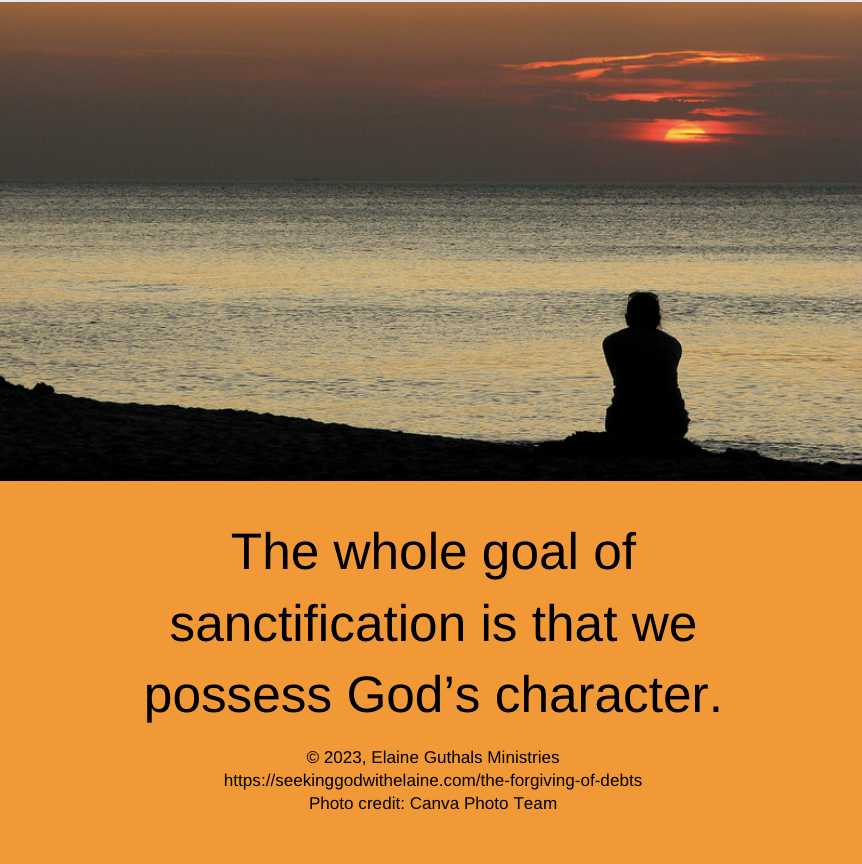In the Lord’s Prayer, Jesus said we are to pray asking God to forgive our debts. This devotional reading looks at what that is and how we transfer that forgiveness to others.
Nuggets
- Debts is an interesting term for sin.
- Because God has loved and forgiven us, we are to love and forgive others.

We come to the confession part of the Lord’s Prayer. This part can trip a lot of us up.
We don’t want our mistakes – let alone our on-purposes – acknowledged and pointed out. Since He know our hearts, can’t we just skip that?
No, we need to get right with God. We need to acknowledge our shortcomings. We need to fess up when we’ve screwed up.
We need to get the relationship in the right place. Relationships take work. We need to be real about where we are at.
Let's Put It into Context
To read devotions in the Habitual Holiness of Heart and Life theme, click the button below.
Here is a running list of nuggets for the theme.
Devotions in the Commit to Grow Our Habits study
Here is a running list of nuggets for the study.
“And forgive us our debts, as we also have forgiven our debtors” (Mt. 6: 12 NIV)
Our Debts
“And forgive us our debts …” (Mt. 6: 12 NIV)
Debts is an interesting term for sin.
Another gospel says, “and forgive us our sins …” (Lk. 11: 4, ESV). That is more the churchy way of saying it, but to me, it really is the best. It is what we are talking about.
Sin is not believing that Jesus is our Savior to save us from our actions by humans that disobey God and break one of His reasonable, holy, and righteous laws and commandments, goes against a purpose He has for us, or follows Satan’s promptings.
- Holy means to be set apart — because of our devotion to God — to become perfect, and morally pure while possessing all virtues and to serve and worship God.
- Perfection means we reach a state of maturity because the combination of the spiritual graces form, when all are present, spiritual wholeness or completeness — holy, sanctified, and righteous.
- Spiritual graces are worldly morals that have been submitted to God to further His kingdom instead of enhancing this world.
- Sanctified means to be set free from sin.
- Righteous means we are free from sin because we are following God’s moral laws.
- Pure means not being sinful or having the stain of sin.
- Virtues are standards of moral excellence.
- Perfection means we reach a state of maturity because the combination of the spiritual graces form, when all are present, spiritual wholeness or completeness — holy, sanctified, and righteous.
Glossary
But we’ve been using the New International Version for the verse. It says debts.
When we think of debts, we think of what we owe. We talk about going into debt – a conscious decision. Yes, sometimes we willfully sin.
The thing is we cannot pay this debt. With our sinful nature so ingrained within us, we cannot pay the penalty for sin ourselves.
Only Christ can pay the debt for our sins.
Manton said that debt also has an element of duty associated with it. This is talking about obedience and worship.
Resource
Debt also speaks of consequences and liability. Ooo, baby. We don’t think there should be a liability because want we don’t the consequences.
Some worldview people say that God shouldn’t call some things sin. We want to love who we want to love, do what we want to do, and live like we want to live.
God said no. Doing things that are not in His character is sin.
It is hard to acknowledge and confess our sins. We want them buried (Jas. 5: 15). But 1 John 1: 9 says, “If we confess our sins, he is faithful and just to forgive us our sins and to cleanse us from all unrighteousness” (ESV).
Our sins won’t be buried. We’ve talked before about the books of Revelation. They will be opened on Judgment Day, and our thoughts and actions will be judged.
Glossary
Trespass is an also interesting way to describe sin. A really old Bible translation used this term.
When you think about it, it is an accurate description. Trespassing means you are going somewhere you aren’t supposed to be. Usually, it is posted to keep you out.
Consequences occur if you disobey the warnings. Think about kids entering an abandoned building so they can have a party.
It is enticing to disobey the warnings; it is secret; they think they won’t be caught; it is rebellious and challenging. Now replace the abandoned building with sin. Sin is all of those things.
But it doesn’t stop at the commission of sins. That is where the forgiveness begins. Forgiveness is, when we ask, the act of God pardoning us because we have shown repentance for breaking His laws and commandments, which allows us to become holy as He is.
- Repentance is acknowledging our separation from God and expressing sorrow for breaking God’s laws and commandments by making the commitment to changing ourselves through obedience so that we no longer do the wrong things.
- Obedience means submitting ourselves to the will of God as it is presented to us and living our lives accordingly.
Stanford gave us a really good reminder. He said that the people asking for forgiveness here are the children of God.
Glossary
That means they have already ABCDed. We are asking for God’s grace to forgive us of our sins.
The ABCDs of Salvation
If you have not become a believer in Christ, please read through the
Plan of Salvation and prayerfully consider what God is asking you to do.
A – admit our sins
B – believe His Son Jesus is our Redeemer
C – confess God as Sovereign Lord
D – demonstrate that commitment by making any changes needed in our lives to live the way in which God has called us
The Disciple’s Job Description
Grace is a free and unmerited gift of love from the Heavenly Father, given through His Son, Jesus Christ, that enables salvation and spiritual healing to believers by the work of the Holy Spirit. God’s grace is the product of the joy of a life with God and His purity.
Glossary
We can only be forgiven when we agree to submit our lives to God. He will not forgive us if we continue to willfully sin.
Saphir put it this way. He wrote, “He who has not received the spirit of forgiveness has not truly received the gift of pardon. … He who does not [forgive] forsakes the spirit of the gospel, and returns to the spirit of legalism.”
Resource
It doesn’t work if our repentance isn’t sincere. Our worship isn’t sincere. Our praise isn’t sincere.
Moore reminded us that we are talking about our moral condition and circumstances here. Our moral condition must be tied into God’s character.
Resource
Our whole purpose of asking God to forgive our sins should be to submit our lives to Him. We show that by becoming like Him.

Our Forgiving
“… as we also have forgiven our debtors” (Mt. 6: 12 NIV)
Because God has loved and forgiven us, we are to love and forgive others.
The second part of the verse tells us how we are to react to being forgiven of our sins/debts/trespasses by God. We are to pass it on.
We are to forgive everyone, not just those who have sinned just a little against us.
Forgiveness has a reason. We are blessed when we forgive others. “Blessed are the merciful, for they shall receive mercy” (Mt. 5: 7 ESV).
Yes, it changed from forgiving to merciful. What is mercy? Even though we deserve bad things as punishment, God doesn’t give them to us.
Don’t you see the connection? It has to do with our attitude. It is based on our love for others. We aren’t selfish, don’t look for the worst, and hold grudges.
That is hard to do when we encounter a wrong by an enemy. We especially love it when karma happens.
But that isn’t how we are to react.
- “Don’t gloat when your enemy falls, and don’t let your heart rejoice when he stumbles, or the LORD will see, be displeased, and turn His wrath away from him” (Prov. 24: 17-18 CSB).
- “Vengeance is mine; I will repay, saith the Lord (Rom. 12: 19, KJV).”
We can’t let God have the vengeance if we are gloating.
God has made it our duty to love others.
There is also instructions to reconcile with them before we approach God. “So if you are offering your gift at the altar and there remember that your brother has something against you, leave your gift there before the altar and go. First be reconciled to your brother, and then come and offer your gift” (Mt. 5: 23-24 ESV).
Barrow had some strong words for those that do not forgive others. He wrote, “If we break it, if we retain any uncharitable inclinations, we deal falsely with God; we forfeit all [pretense] to mercy and [favor] from Him; we are neither qualified for mercy, nor shall obtain it from God.”
Resource
It makes sense when we think about it. We are being sanctified. Sanctification is the transformational process of the mind, body, and soul, which begins with regeneration; gradually changes our nature and morals through the promptings of the Holy Spirit; and ends with perfected state of spiritual wholeness or completeness.
- Regeneration is being changed from spiritually dead to spiritually alive and the internal new birth and requickening that God brings about through the work of the Holy Spirit to give us new character.
- Spiritual death is the separation from God that occurred as a consequence of Adam and Eve’s original sin.
- The spiritually alive are those who have ABCDed, so they are no longer separated from God.
- Spiritual death is the separation from God that occurred as a consequence of Adam and Eve’s original sin.
Glossary
The whole goal of sanctification is that we possess God’s character. God forgives. We must, too, to be like Him.

Jesus said that we have to forgive as God forgives. Winslow and Hall told us the characteristics of His forgiveness.
- Immediately
- Absolutely
- Completely
- Heartily
Not only that, but Winslow also reminded us God forgets. “He has removed our sins as far from us as the east is from the west” (Ps. 103: 12 NLT).
Resources
For all the worldview wants us to forgive others and live in harmony, they have trouble forgiving people that don’t think as they do. They also sometimes see a forgiving spirit as a weakness.
Bottom line is don’t stoop to our enemy’s level (Prov. 25: 21-22). Take the high road. Work it out with them. Get over it. Put it to bed. Move on.
We have heard it before. God forgives us much more than we could ever forgive others.

Making the Connections #1
I was kind of thrown for a loop when I read Edwards’ Our Debt sermon. He was talking about fact and theory of forgiveness.
I kind of did a very quick search through some psychology articles — emphasis on very and quick. So, I may have glossed over something or totally missed it, but here is what I saw.
- Forgiveness is an attitude.
- Forgiveness repairs broken bonds and does better at creating them than communication does.
- Forgiveness is fostered by empathy.
- Yet, forgiveness is more about the forgiven than the one being forgiven.
Resources
But then Edwards went on to say something that resonated with me. He wrote, “We are led to regard forgiveness as a [favor], and not as a claim.”
Resource
That got things jumbled up. We grant favors. We don’t have to, but we choose to do it.
God doesn’t say, “If you feel like it, forgive Tom.” “It’s okay to say that you forgive Sally, but really don’t.”
God point blank says forgive. Not partially. Certainly not in words only.
Immediately, absolutely, completely, and heartily.
Making the Connections #2
Let’s think about placement a second. In the last devotion, we talked about the daily bread in Matthew 6: 11.
We need Jesus in our lives. He is our daily Bread. Through Him and Him alone do we receive forgiveness for our sins.
We only receive Jesus as our Savior when we ask Him to be just that. We have to submit our lives to following God’s and commandments.
But don’t elevate us because we ask. Don’t think forgiveness happens because we repent — even though non-repentance doesn’t bring forgiveness. Don’t think we earn the forgiveness in any way.
Honor God because He extends forgiveness to us through His grace. That is the only forgiveness worth having.
Making the Connections #3
Hall identified three components that we have to possess to show our sincerity in wanting Divine forgiveness.
- Conviction
- Contrition
- Confession
Our sole purpose must be to repent and turn away from our sins. We must be seeking the transformation that is in the disciple’s job description.
Resource
The Disciple’s Job Description
Complete Job Description
Individual Description
Job Duty #1
Be a Living Sacrifice (Romans 12: 1-2)
If these three components are not present in our petition, our petition is not sincere. Sincerity is shown by having a forgiving, merciful spirit within us. We show gratitude to God by forgiving others.
How Do We Apply This?
- Sincerely ask God to forgive our sins, and then sincerely forgive others.
- Forgive to increase our enjoyment of our own forgiveness.
- Forgive to corroborate our faith.
Resource
Father God. We praise You for Your merciful spirit. We do not deserve Your forgiveness, yet You give it when we sincerely believe Jesus paid the price for our sins. Grow that forgiving, merciful within us so that we can forgive others. Amen.
What do you think?
Leave me a comment below (about this or anything else) or head over to my Facebook group for some interactive discussion.
If you don’t understand something and would like further clarification, please contact me.
If you have not signed up for the email providing the link to the devotions and the newsletter, do so below.
If God has used this devotion to speak with you, consider sharing it on social media.